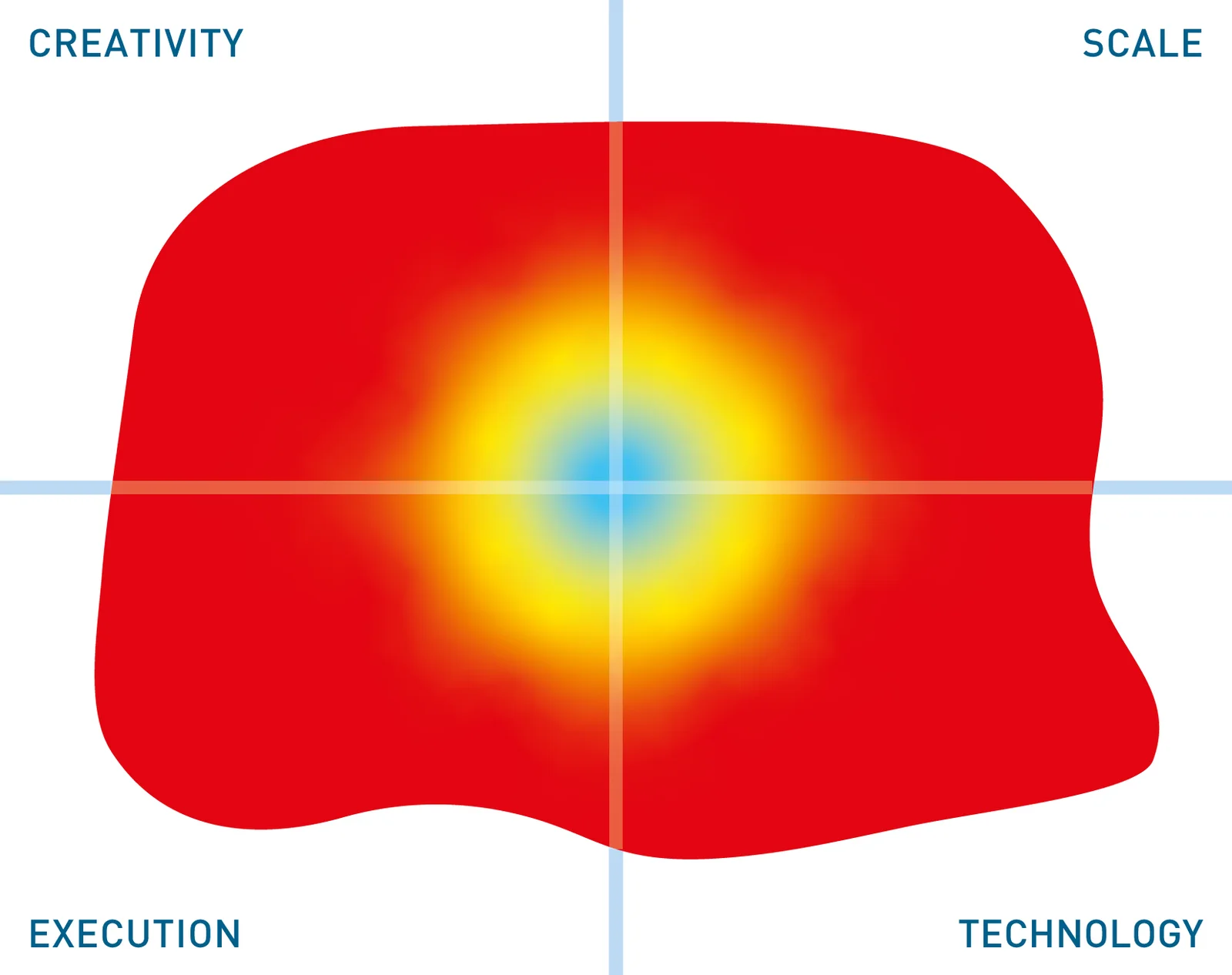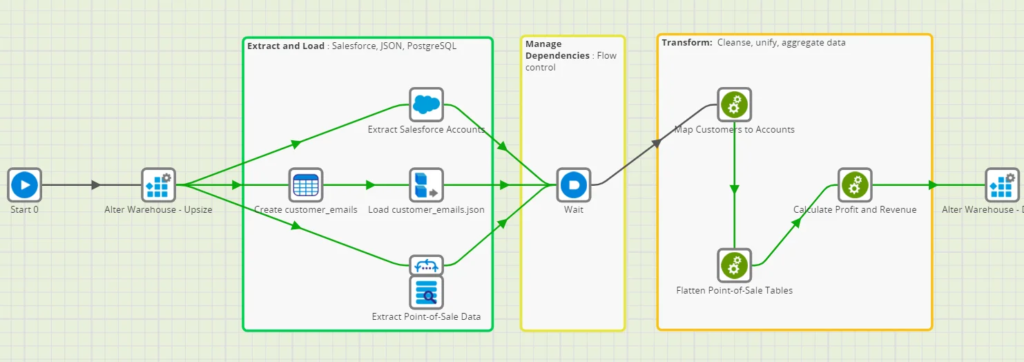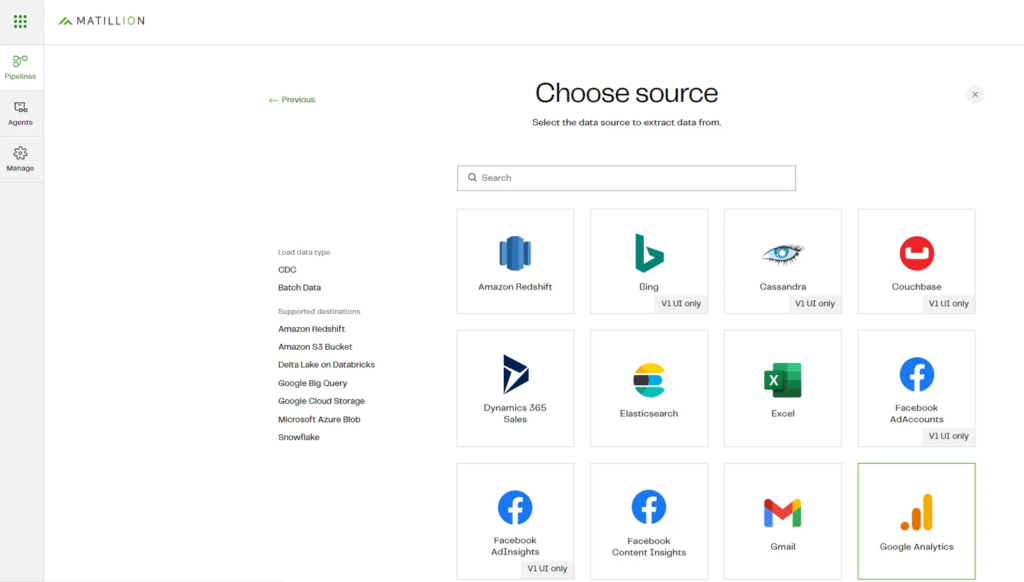Matillion ETL
Update solution on October 3, 2022

Matillion ETL is a cloud-native data integration tool that sits inside your virtual private cloud, although despite its name it operates using an ELT paradigm, which is to say that it transforms the data after, rather than before, it has been loaded into its target environment. A second tool, Matillion Data Loader, exists to facilitate migrations from existing environments into cloud data warehouses and data lakes via the creation of data pipelines. Both platforms natively support all the major cloud platforms, including cloud data warehouses such as Snowflake and Databricks. That said, Matillion Data Loader supports slightly fewer data sources than the main product. The company also offers Matillion Hub, a ‘central nervous system’ for managing your Matillion services, and Matillion Exchange, a marketplace for community-created assets.
Customer Quotes
“Matillion Data Loader allowed us to solve our problem without any changes required to the source and we were live within weeks.”
DocuSign
“We chose Matillion due to its cloud-native architecture, ease of deployment, adaptability, and smaller ramp-up curve. We have achieved 5X improvement in our data processing speed.”
Pacific Life
Matillion ETL primarily offers a graphical, low-code development user interface for architecting your ELT processes. This of course includes transformations, as well as cloud infrastructure orchestration. It is deployed – as mentioned, to your virtual private cloud – as one (or more) of a series of virtual machine images, each one tailored for a specific cloud platform. APIs are available for capturing data lineage and other metadata as part of your ELT processes. The product also provides infrastructure management capabilities within the same (low-code) environment.

Under the hood, Matillion ETL works by generating SQL code. It makes extensive use of dynamic variables in order to minimise any required code regeneration (needed, for example, whenever there are schema changes), which is the biggest downside of any code generating tool. Other notable points are that, while Matillion ETL itself does not provide CDC, it does support technologies – such as Snowflake Streams – which provide equivalent functionality. In addition, Matillion Data Loader offers CDC (see below). There is also a built-in job scheduler, and you can define listeners that will trigger jobs when required.
Matillion ETL offers a significant number (90+) of source connectors. These are primarily application-oriented. There are also native connectors (much to be preferred for performance reasons) to most popular relational databases, although the overall number of database connectors is relatively limited. Facilities exist to build your own connectors (using a REST API) to source applications and systems, but such functionality does not currently extend to targets.
That said, one of Matillion ETL’s primary strengths lies in the tightness of its integration with its target environments. While excellent for supported environments, implementing such depth of capability also explains why Matillion ETL does not support building your own, as there is a significant investment in each target: it is not simply a question of building a connector. Matillion ETL supports cloud platforms, including the ‘big three’ of AWS, Azure and Google Cloud, as well as Snowflake, Redshift, and Databricks. Multi-cloud is supported on all of Matillion’s platforms. Support for cloud object storage, such as Amazon S3, is also provided.

Fig 2 – Matillion Data Loader
Matillion Data Loader is a no-code offering for building data pipelines. It leverages an agent-based, hybrid-SaaS architecture – it operates like a SaaS, but your data always remains within your environment – and a freemium, consumption-based pricing model. For most potential customers, it will be most appealing as a fast and easy way to get your data into the cloud. It is even simpler to use than Matillion ETL, and like its sister product it offers a broad range of connectivity options, including compatibility with batch replication and CDC.
On the other hand, it doesn’t have a transformative capability: it is strictly a migratory tool. On the third hand, Matillion ETL itself (and, frankly, most data integration offerings) will be overkill for the sorts of tasks that don’t require transformations. Notably, and unlike Matillion ETL, Matillion Data Loader also offers CDC. This is log-based, and can integrate with your other data integration processes (for example, to trigger downstream transformations).
Matillion ETL has been designed to take full advantage of the cloud via features such as native cloud integrations and push-down ELT to major cloud platforms. It is enterprise-ready, enabled in part by its scalability and catalogue support, and it offers a user-friendly interface that incorporates low-code, drag-and-drop techniques for building data pipelines and integration processes.
Moreover, it provides bespoke deployment images for each cloud platform as well as a range of prebuilt connectors, particularly for application-based sources. In addition, the depth of integration offered often goes further than the competition. On the other hand, database and data warehouse support is relatively limited (perhaps due to the latter point).
Matillion Data Loader in particular is a highly fit-for-purpose tool for enabling cloud migrations, one of the more significant data integration use cases at the moment. It is even simpler to use than Matillion ETL, is available as a freemium offering, and is both lightweight and secure (thanks to its hybrid-SaaS deployment model). In other words, it is very easy to start getting value out of it. In turn, because of Matillion Data Loader, Matillion as a whole can address both new implementations of supported data warehouses and cases where companies are migrating to these environments.
The Bottom Line
Matillion ETL offers relatively pure-play ELT, and together with Matillion Data Loader it makes for an effective and easy to use solution for data integration, especially in the cloud.
Related Company
Connect with Us
Ready to Get Started
Learn how Bloor Research can support your organization’s journey toward a smarter, more secure future."
Connect with us Join Our Community
